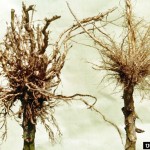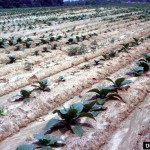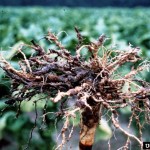Nematodes
Recommended Varieties for Nematodes: CC13, CC 33 and CC 35
Pictures provided by Clemson University – USDA Cooperative Extension Slide Series, bugwood.org and R.J. Reynolds Tobacco Company Slide Set, R.J. Reynolds Tobacco Company, bugwood.org
Nematodes are microscopic round worms. Several types of nematodes attack tobacco plants. The most severe are the root knot nematodes, which feed on the roots. These nematodes stunt the plants and may cause the leaves to turn pale, irregular plant growth, excessive wilting by day, and poor response to fertilizers.
Nematode problems generally occur in specific areas within a field which are deficient in nitrogen and potassium. Plants in these areas may show signs of leaf tip burn. In some spots, plants may show severe symptoms, while other spots show no signs of any attack. A detailed analysis of root and soil samples is needed to correctly diagnose the problem. Nematode problems occur more frequently in warm climates with sandy soils. High temperatures accelerate the life cycle of nematodes.
There are several cultivars resistant to Meloidogyne incognita, races 1 and 3; however, damages caused by other types have been rising year after year. Besides the M. incognita, the most common types are M. javanica and M. arenaria. Cross Creeks Seed owns the largest tobacco dedicated nematode nursery in the world. Cross Creek Seed’s breeding program develops hybrid varieties, which, in addition to their resistance to types 1 and 3 of the M. incognita group, are also tolerant to M. javanica, M. arenari, and Cyst.
All Virginia hybrids released by Cross Creek Seed are resistant to M. incognita and the ones listed below are also resistant to M. javanica and M. arenaria types.


